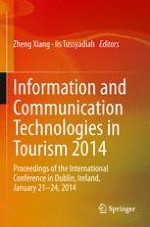2013 | OriginalPaper | Buchkapitel
Breaking Up is Hard to Do: Why Do Travellers Unlike Travel-Related Organizations?
verfasst von : Ulrike Gretzel, Anja Dinhopl
Erschienen in: Information and Communication Technologies in Tourism 2014
Aktivieren Sie unsere intelligente Suche, um passende Fachinhalte oder Patente zu finden.
Wählen Sie Textabschnitte aus um mit Künstlicher Intelligenz passenden Patente zu finden. powered by
Markieren Sie Textabschnitte, um KI-gestützt weitere passende Inhalte zu finden. powered by
